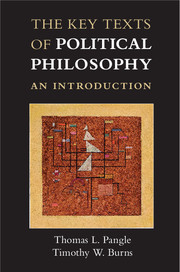Book contents
- Frontmatter
- Dedication
- Contents
- Acknowledgments
- Introduction
- Part I Classical Political Philosophy
- Part II Biblical Political Theology
- Part III Modern Political Philosophy
- Part IV Modernity in Question
- 11 Rousseau’s First and Second Discourses
- 12 Marx and Engels: The Communist Manifesto
- 13 Tocqueville’s Democracy in America
- 14 Nietzsche and His Zarathustra
- Name Index
- Subject Index
- References
11 - Rousseau’s First and Second Discourses
Published online by Cambridge University Press: 05 October 2014
- Frontmatter
- Dedication
- Contents
- Acknowledgments
- Introduction
- Part I Classical Political Philosophy
- Part II Biblical Political Theology
- Part III Modern Political Philosophy
- Part IV Modernity in Question
- 11 Rousseau’s First and Second Discourses
- 12 Marx and Engels: The Communist Manifesto
- 13 Tocqueville’s Democracy in America
- 14 Nietzsche and His Zarathustra
- Name Index
- Subject Index
- References
Summary
Jean-Jacques Rousseau (1712–1778) launched the first modern philosophic rebellion against the Enlightenment – that vast cultural revolution whose philosophic foundations we have studied in Machiavelli, Bacon, Hobbes, Locke, and Montesquieu. As we have seen, the Enlightenment entails a lowered conception of humanity’s moral nature. This new, lowered view of humanity is to be popularized, spread to the mass of mankind, by the philosophers and their followers writing as educational propagandists. Philosophers aim to reshape Christianity into a religion of (modern) reason, and to make scientific philosophy, rather than pious traditions, the source of mankind’s conceptions of “nature’s God.” This constitutes a dramatic break with the classical view of the proper relation between rationalist philosophy or science and healthy political society. The ancients, starting with Socrates, had taught that philosophy or science should keep muted or hidden its critical questioning, because healthy republican society, centered on self-transcending moral and civic virtue, needs to live in a medium of tradition and opinion that is endangered by philosophic skepticism.
Rousseau returns to something like the Socratic view of the relation between philosophy and healthy civil society. But he does not do so on the basis of Socratic or classical political philosophy. He contends that we can and must appreciate the practical wisdom and virtue of classical political life on a modern or even ultramodern philosophic and scientific basis. Otherwise stated, Rousseau effects a kind of synthesis between ancient practice and modern theory, or between classical republicanism and the modern philosophic and scientific conception of nature and of human nature. It is a synthesis that subordinates the ancient ingredient to the modern. But Rousseau argues that his modern predecessors have failed to grasp the full, radical, and problematic meaning and implications of their own discoveries about human nature.
- Type
- Chapter
- Information
- The Key Texts of Political PhilosophyAn Introduction, pp. 331 - 364Publisher: Cambridge University PressPrint publication year: 2014



